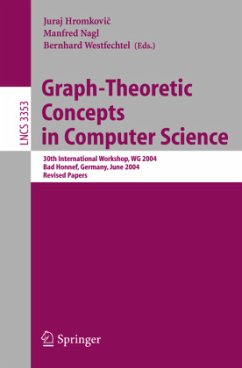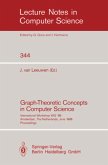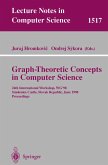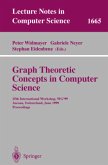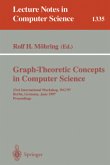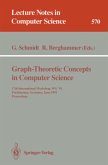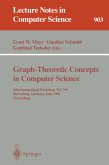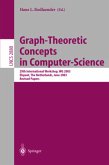This book constitutes the thoroughly refereed post-proceedings of the 30th International Workshop on Graph-Theoretic Concepts in Computer Science, WG 2004, held in Bad Honnef, Germany in June 2004.
The 31 revised full papers presented together with 2 invited papers were carefully selected from 66 submissions during two rounds of reviewing and improvement. The papers are organized in topical sections on graph algorithms: trees; graph algorithms: recognition and decomposition; graph algorithms: various problems; optimization and approximation algorithms; parameterized complexity and exponential algorithms; counting, combinatorics, and optimization; applications in bioinformatics and graph drawing; and graph classes and NP-hard problems.
During its 30-year existence, the International Workshop on Graph-Theoretic Concepts in Computer Science has become a distinguished and high-quality computer science event. The workshop aims at uniting theory and practice by demonstrating how graph-theoretic concepts can successfully be applied to v- ious areas of computer science and by exposing new theories emerging from applications. In this way, WG provides a common ground for the exchange of information among people dealing with several graph problems and working in various disciplines. Thereby, the workshop contributes to forming an interdis- plinary research community. The original idea of the Workshop on Graph-Theoretic Concepts in C- puter Science was ingenuity in all theoretical aspects and applications of graph concepts, wherever applied. Within the last ten years, the development has strengthened in particular the topic of structural graph properties in relation to computational complexity. This workshop has become pivotal for the c- munity interested in these areas.An aimspeci?c to the 30thWG was to support the central role of WG in both of the prementioned areas on the one hand and on the other hand to promote its originally broader scope. The 30th WG was held at the Physikzentrum Bad Honnef, which serves as the main meeting point of the German Physical Society. It o?ers a secluded setting for research conferences, seminars, and workshops, and has proved to be especiallystimulatingforfruitful discussions.Talksweregiveninthenewlecture hall with a modern double rear projection, interactive electronic board, and full video conferencing equipment.
The 31 revised full papers presented together with 2 invited papers were carefully selected from 66 submissions during two rounds of reviewing and improvement. The papers are organized in topical sections on graph algorithms: trees; graph algorithms: recognition and decomposition; graph algorithms: various problems; optimization and approximation algorithms; parameterized complexity and exponential algorithms; counting, combinatorics, and optimization; applications in bioinformatics and graph drawing; and graph classes and NP-hard problems.
During its 30-year existence, the International Workshop on Graph-Theoretic Concepts in Computer Science has become a distinguished and high-quality computer science event. The workshop aims at uniting theory and practice by demonstrating how graph-theoretic concepts can successfully be applied to v- ious areas of computer science and by exposing new theories emerging from applications. In this way, WG provides a common ground for the exchange of information among people dealing with several graph problems and working in various disciplines. Thereby, the workshop contributes to forming an interdis- plinary research community. The original idea of the Workshop on Graph-Theoretic Concepts in C- puter Science was ingenuity in all theoretical aspects and applications of graph concepts, wherever applied. Within the last ten years, the development has strengthened in particular the topic of structural graph properties in relation to computational complexity. This workshop has become pivotal for the c- munity interested in these areas.An aimspeci?c to the 30thWG was to support the central role of WG in both of the prementioned areas on the one hand and on the other hand to promote its originally broader scope. The 30th WG was held at the Physikzentrum Bad Honnef, which serves as the main meeting point of the German Physical Society. It o?ers a secluded setting for research conferences, seminars, and workshops, and has proved to be especiallystimulatingforfruitful discussions.Talksweregiveninthenewlecture hall with a modern double rear projection, interactive electronic board, and full video conferencing equipment.

